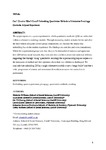Can’t Count or Won’t Count? Embedding Quantitative Methods in Substantive Sociology Curricula: A Quasi-Experiment
| dc.contributor.author | Williams, M | |
| dc.contributor.author | Sloan, L | |
| dc.contributor.author | Cheung, SY | |
| dc.contributor.author | Sutton, Carole | |
| dc.contributor.author | Stevens, Sebastian | |
| dc.contributor.author | Runham, L | |
| dc.date.accessioned | 2016-07-14T16:01:32Z | |
| dc.date.available | 2016-07-14T16:01:32Z | |
| dc.date.issued | 2016-06 | |
| dc.identifier.issn | 0038-0385 | |
| dc.identifier.issn | 1469-8684 | |
| dc.identifier.uri | http://hdl.handle.net/10026.1/5062 | |
| dc.description.abstract |
<jats:p> This paper reports on a quasi-experiment in which quantitative methods (QM) are embedded within a substantive sociology module. Through measuring student attitudes before and after the intervention alongside control group comparisons, we illustrate the impact that embedding has on the student experience. Our findings are complex and even contradictory. Whilst the experimental group were less likely to be distrustful of statistics and appreciate how QM inform social research, they were also less confident about their statistical abilities, suggesting that through ‘doing’ quantitative sociology the experimental group are exposed to the intricacies of method and their optimism about their own abilities is challenged. We conclude that embedding QM in a single substantive module is not a ‘magic bullet’ and that a wider programme of content and assessment diversification across the curriculum is preferential. </jats:p> | |
| dc.format.extent | 435-452 | |
| dc.format.medium | Print-Electronic | |
| dc.language | en | |
| dc.language.iso | eng | |
| dc.publisher | SAGE Publications | |
| dc.subject | embedding | |
| dc.subject | pedagogy | |
| dc.subject | quantitative methods | |
| dc.subject | quasi-experiments | |
| dc.subject | teaching | |
| dc.title | Can’t Count or Won’t Count? Embedding Quantitative Methods in Substantive Sociology Curricula: A Quasi-Experiment | |
| dc.type | journal-article | |
| dc.type | Journal Article | |
| plymouth.author-url | https://www.webofscience.com/api/gateway?GWVersion=2&SrcApp=PARTNER_APP&SrcAuth=LinksAMR&KeyUT=WOS:000377141600004&DestLinkType=FullRecord&DestApp=ALL_WOS&UsrCustomerID=11bb513d99f797142bcfeffcc58ea008 | |
| plymouth.issue | 3 | |
| plymouth.volume | 50 | |
| plymouth.publication-status | Published | |
| plymouth.journal | Sociology | |
| dc.identifier.doi | 10.1177/0038038515587652 | |
| plymouth.organisational-group | /Plymouth | |
| plymouth.organisational-group | /Plymouth/Faculty of Health | |
| plymouth.organisational-group | /Plymouth/PS - Academic Partnerships | |
| plymouth.organisational-group | /Plymouth/REF 2021 Researchers by UoA | |
| plymouth.organisational-group | /Plymouth/REF 2021 Researchers by UoA/UoA20 Social Work and Social Policy | |
| plymouth.organisational-group | /Plymouth/REF 2021 Researchers by UoA/UoA20 Social Work and Social Policy/UoA20 Social Work and Social Policy MANUAL | |
| plymouth.organisational-group | /Plymouth/Research Groups | |
| plymouth.organisational-group | /Plymouth/Research Groups/Institute of Health and Community | |
| plymouth.organisational-group | /Plymouth/Users by role | |
| plymouth.organisational-group | /Plymouth/Users by role/Academics | |
| dc.publisher.place | England | |
| dc.identifier.eissn | 1469-8684 | |
| dc.rights.embargoperiod | No embargo | |
| rioxxterms.versionofrecord | 10.1177/0038038515587652 | |
| rioxxterms.licenseref.uri | http://www.rioxx.net/licenses/all-rights-reserved | |
| rioxxterms.type | Journal Article/Review |


